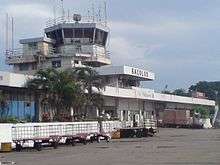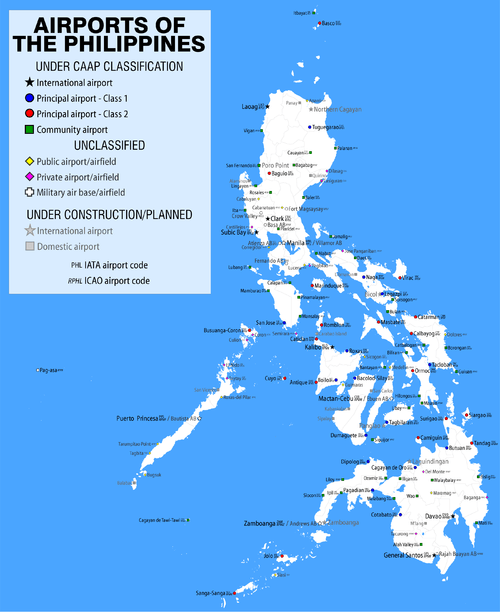Bacolod City Domestic Airport
| Bacolod City Domestic Airport Paliparang Domestiko ng Lungsod ng Bacolod Domestiko nga Hulugpaan sang Dakbanwa sang Bacolod | |||||||||||
|---|---|---|---|---|---|---|---|---|---|---|---|
 Exterior of Bacolod City Domestic Airport | |||||||||||
| IATA: none – ICAO: none | |||||||||||
| Summary | |||||||||||
| Airport type | Public | ||||||||||
| Operator | Air Transportation Office | ||||||||||
| Serves | Bacolod | ||||||||||
| Location | Barangay Singcang, Bacolod | ||||||||||
| Elevation AMSL | 8 m / 25 ft | ||||||||||
| Coordinates | 10°38′33.04″N 122°55′46.62″E / 10.6425111°N 122.9296167°E | ||||||||||
| Runways | |||||||||||
| |||||||||||
| Statistics (2005) | |||||||||||
| |||||||||||
|
Statistics from the Air Transportation Office.[1] | |||||||||||
Bacolod City Domestic Airport (Filipino: Paliparang Domestiko ng Lungsod ng Bacolod, Hiligaynon: Domestiko nga Hulugpaan sang Dakbanwa sang Bacolod) (IATA: BCD, ICAO: RPVB), also known as Bacolod Airport, was the airport serving the general area of Bacolod, the capital city of Negros Occidental in the Philippines. It was one of the busiest airports in the Western Visayas region and was one of four trunkline airports, or major commercial domestic airports, in the region, the others being Mandurriao Airport in Iloilo City, Roxas Airport in Roxas and Puerto Princesa Airport in Puerto Princesa. This airport was replaced by the new Bacolod-Silay International Airport, located in nearby Silay.
It was classified as such by the Air Transportation Office, a body of the Department of Transportation and Communications that is responsible for the operations of all other airports in the Philippines except the major international airports. As of February 2007, Cebu Pacific had increased its number of flights from Manila to Bacolod. The airport surpassed the Iloilo City Mandurriao Airport in the number of arriving passengers.
The airport was built by the Lopez family in 1936 to serve the Iloilo - Negros Air Express Company's flights to and from Bacolod, Iloilo and Manila. It was bought by Philippine Airlines after World War II.[2] The Bacolod City Domestic Airport ceased operations on January 17, 2008, prior to the opening of the Bacolod-Silay International Airport which began operations the day after.[3]As of 2012, the airport is closed to air traffic however the terminal now serves as a ticketing office for Philippine Airlines, while the Cebu Pacific Terminal around 400m from the main terminal was made into an Aviation School for aircraft mechanics, as well as ground pilot training.
In 2016, Senator Franklin Drilon suggested to the city government of Bacolod to re-develop the whole airport grounds into a business park, following the success of converting the Mandurriao Airport in Iloilo City into a central business district. [4]
Airlines and destinations
The destinations of Bacolod City Domestic Airport before its closure.
| Airlines | Destinations |
|---|---|
| Air Philippines | Cebu, Manila |
| Cebu Pacific Air | Cebu, Manila |
| Philippine Airlines | Manila |
Incidents
On March 22, 1998, Philippine Airlines Flight 137 overshot the runway while attempting a landing at Bacolod. There were no casualties among the passengers and crew but three people on the ground were killed.[5]
See also
References
- ↑ PASSENGER MOVEMENT CY 2001-2005, Air Transportation Office, retrieved July 8, 2007
- ↑ Gomez, Carla P. (2008-01-09). "Vice President to open airport in Silay Jan. 18". Visayan Daily Star Publications, Inc. Archived from the original on 2008-04-12. Retrieved 2008-05-12.
- ↑ Gomez, Carla P. (2008-01-17). "Bacolod mayor snubbed in airport inauguration?". Visayan Daily Star Publications, Inc. p. 1. Archived from the original on 2008-01-18. Retrieved 2008-01-17.
- ↑ http://www.watchmendaily.com/news/new-bacolod-economic-highway-to-be-completed-by-2017-drilon-suggests-re-developing-old-bacolod-airport/
- ↑ Accident description at the Aviation Safety Network
External links
- Airport information for RPVB at World Aero Data. Data current as of October 2006.Source: DAFIF.
- Airport information for BCD / RPVB at Great Circle Mapper. Source: DAFIF (effective October 2006).
- Accident history for BCD / RPVB at Aviation Safety Network
